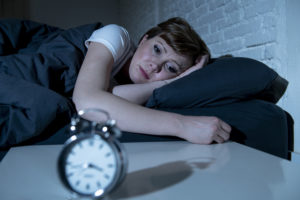Unmasking the Silent Sleeper: Sleep Apnea in Post-Menopausal Women

The Connection Between Sleep Apnea and Post-Menopausal Symptoms
Are you navigating the significant life transition of menopause, only to find your sleep more elusive and less refreshing than ever before? You’re not alone. While sleep disturbances are commonly associated with menopause, a surprisingly prevalent and often undiagnosed condition for women in this life stage is sleep apnea.
At SleepRight McKinney, Dr. Lawrence understands the unique challenges post-menopausal women face when it comes to sleep. We are dedicated to providing compassionate, effective solutions to help you reclaim restful nights and energized days. Don’t let interrupted sleep define your post-menopausal years – call 972-542-8400 to schedule your personalized consultation with our McKinney sleep apnea specialist. Add surrounding locations
Why Choose Dr. Lawrence for Sleep Apnea Treatment Near You?
Choosing a sleep apnea specialist near you means convenience and accessibility. SleepRight McKinney has helped real sleep apnea patients in Allen, Anna, and Melissa access sleep apnea solutions without a long commute.
Don’t let another night of restless sleep pass you by. If you’re seeking effective, comfortable, and personalized sleep apnea treatment from a trusted expert in McKinney, call SleepRight McKinney at 972-542-8400 today to schedule your free sleep consultation.
Why Menopause Increases Sleep Apnea Risk
For years, sleep apnea was often considered primarily a “man’s disease,” largely due to the more obvious symptom of loud, disruptive snoring. However, research now clearly indicates that women, particularly as they transition through menopause, are increasingly susceptible to obstructive sleep apnea (OSA):
- Estrogen’s Protective Role: Before menopause, estrogen plays a protective role in maintaining airway muscle tone and stability. It helps keep the upper airway open during sleep. As estrogen levels decline during perimenopause and post-menopause, this protective effect diminishes. The muscles in the throat become more relaxed and prone to collapse, leading to narrowed or completely blocked airways during sleep.
- Weight Gain and Fat Distribution: Menopause often brings about changes in body composition, including an increase in overall body fat and a shift in fat distribution, particularly around the neck and abdomen.
- Hot Flashes and Night Sweats: While not a direct cause of sleep apnea, hot flashes and night sweats are hallmark symptoms of menopause that frequently disrupt sleep.
- Disrupted Sleep Architecture: Hormonal fluctuations can also interfere with the brain’s natural sleep-wake cycles (circadian rhythm) and the progression through different sleep stages.
Studies show that the prevalence of sleep apnea in post-menopausal women can be as high as 47% to 67%, a stark contrast to pre-menopausal women. This highlights the critical need for increased awareness and diagnosis in this demographic.
Recognizing the Signs: Sleep Apnea Symptoms in Women Near Frisco, TX
One of the reasons sleep apnea often goes undiagnosed in women is that their symptoms can differ from those typically seen in men. While men commonly exhibit loud snoring, gasping, and choking, women’s symptoms may be more subtle or easily mistaken for other menopausal issues or general fatigue.
Common symptoms of sleep apnea in post-menopausal women include:
- Chronic Fatigue and Daytime Sleepiness: Despite getting what feels like enough sleep, you wake up exhausted and remain fatigued throughout the day. This isn’t just “menopausal tiredness.”
- Insomnia or Difficulty Staying Asleep: Many women with sleep apnea report trouble falling asleep or waking up frequently during the night, sometimes attributing it to anxiety or hot flashes.
- Morning Headaches: Waking up with a headache that often dissipates after a while can indicate reduced oxygen to the brain overnight.

- Mood Changes: Irritability, anxiety, depression, and difficulty concentrating or “brain fog” are common in menopause, but can be significantly worsened by the chronic sleep deprivation caused by sleep apnea.
- High Blood Pressure: Untreated sleep apnea is a significant risk factor for hypertension and other cardiovascular issues.
If any of these symptoms sound familiar, call our sleep apnea specialist near you at 972-542-8400 to get evaluated for possible sleep apnea or other sleep disorders.
The Dangers of Undiagnosed Sleep Apnea in Post-Menopausal Women
Beyond the immediate impact on your daily energy and mood, untreated sleep apnea poses serious long-term health risks, particularly for post-menopausal women who may already be at an increased risk for certain conditions. These risks include:
- Cardiovascular Disease: Sleep apnea significantly increases the risk of high blood pressure, heart attack, stroke, and irregular heart rhythms. The repeated drops in oxygen levels and surges in adrenaline during apneic events put immense strain on the cardiovascular system.
- Diabetes: There’s a strong link between sleep apnea and insulin resistance, increasing the risk or worsening existing Type 2 diabetes.
- Weight Gain: Poor sleep can disrupt hormones that regulate appetite (leptin and ghrelin), making weight management even more challenging.
- Increased Risk of Accidents: Daytime sleepiness can impair concentration and reaction time, leading to a higher risk of accidents at home and while driving.
- Depression and Anxiety: The chronic sleep deprivation and physiological stress from sleep apnea can exacerbate or even trigger mental health issues.
Your Path to Restorative Sleep with Dr. Paul Lawrence in McKinney, TX
At SleepRight McKinney, Dr. Paul Lawrence understands the unique presentation and increased prevalence of sleep apnea in post-menopausal women. We are dedicated to providing a comfortable, accurate diagnosis and personalized treatment options to help you achieve the restful sleep you deserve.
Take the proactive step towards healthier, more refreshing sleep. Call SleepRight McKinney at 972-542-8400 today to schedule your free sleep apnea consultation in McKinney! We welcome patients of all ages from Anna, Princeton, and Frisco.


